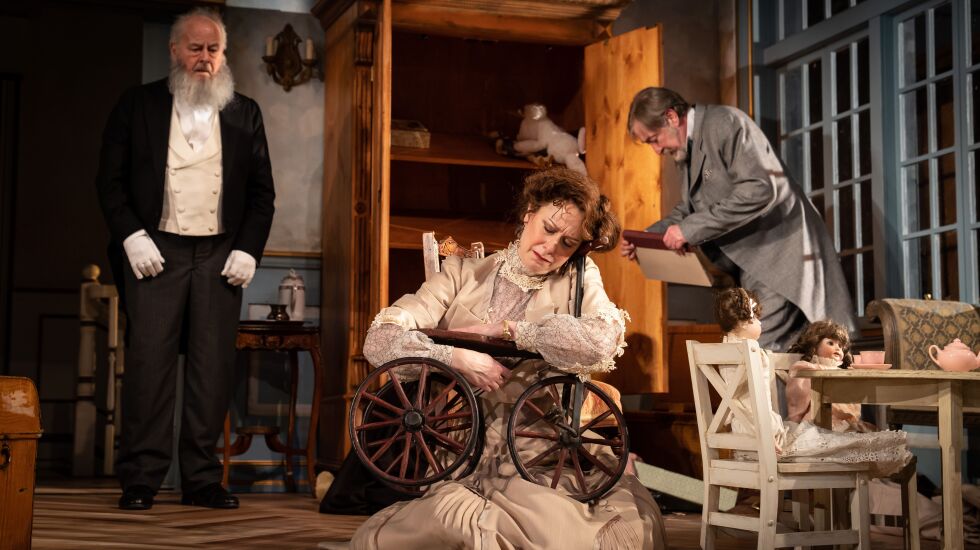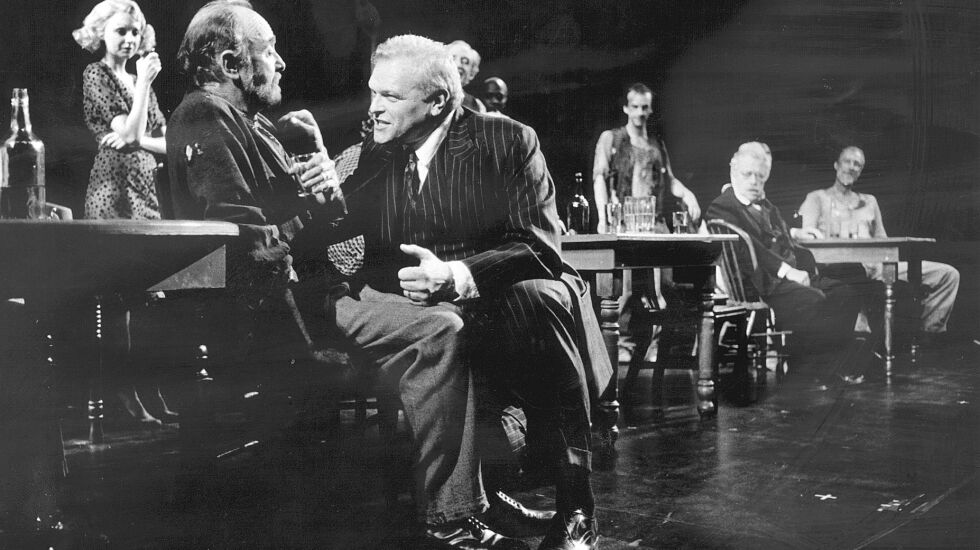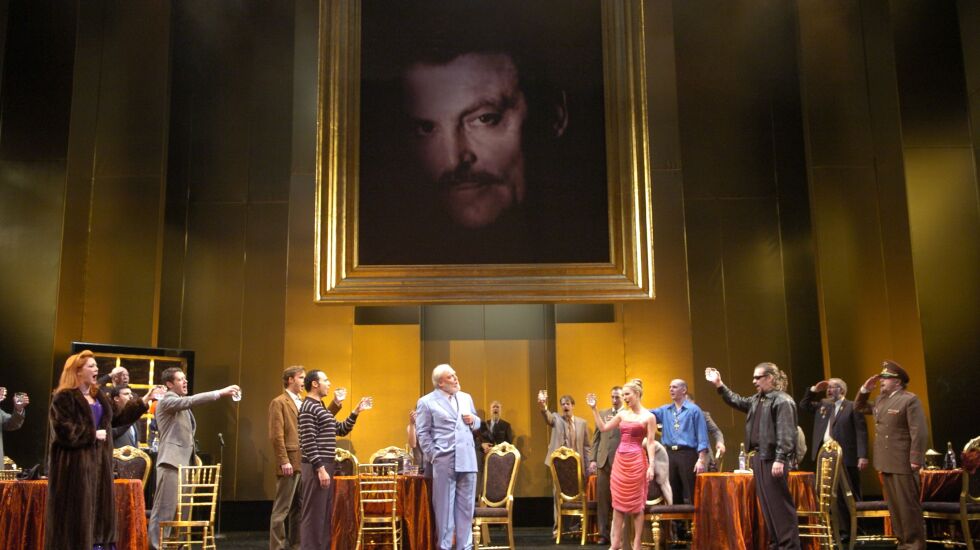
In 1986, the Goodman Theatre’s newly appointed artistic director Robert Falls sat down with the actor Brian Dennehy for a joint radio interview with historian extraordinaire Studs Terkel. Dennehy opened the segment reading “On the Joy of Beginnings,” a poem by the playwright Bertolt Brecht.
He and Falls were talking up Brecht’s drama “Galileo,” Falls’ directorial debut at the Goodman, where he’d just taken up the artistic helm. The stanzas worked as as an audio teaser.
“ ‘Galileo’ was very much about arrivals and announcing yourself,” Falls said during a spring chat, shortly after opening Anton Chekhov’s “The Cherry Orchard,” his final production as the company’s artistic director.
“ ‘Cherry Orchard’ is the other end; it’s about departures, transitions, loss,” Falls continued.
“New beginnings” was the theme of his first season at the Goodman, Falls told Terkel in the 1986 interview.
As for the current season, “If I had to pick a theme for right now? I guess I would say transitions,” Falls said.

Falls stepped down from the artistic director post at the close of the 2021-22 season. The 2022-23 season is the last he programmed.
He may have departed the artistic directorship of the iconic Chicago theater company, but Falls’ artistic stamp remains indelible.
Under his leadership, the Goodman produced more than 150 world premieres. It also sent more than two dozen shows to Broadway, where they garnered 22 Tony Awards by the theater’s count. Falls won his own Tony in 1999 for his direction of “Death of a Salesman,” starring Dennehy in the title role. Under Falls’ stewardship, the Goodman also collected a whopping 160 Joseph Jefferson Awards (the local version of the Tonys). In 2016, Falls was inducted into the American Theater Hall of Fame.
Theater is an ephemeral art, but Falls’ contributions are literally cemented in brick and mortar. With Goodman executive director Roche Schulfer as point man, Falls helped steer the theater’s monumental 2000 move from a subterranean space behind the Art Institute to a $46 million, two-theater campus in the heart of the Loop. It is also home to the Robert Falls Rehearsal Wing, a spacious, airy testament to his legacy.
Falls shrugs off his contributions to the move as minimal.
“That was all Roche,” he said. “Roche and the board worked on that move for 12 years. I 100% couldn’t have done what I’ve managed to do here without Roche. There have been many, many moments where he’s led me to do my best work.”

Falls selects none of the above when asked to name his most significant achievement during his tenure.
“The Artistic Collective,” he said. “That was something I wanted to establish from the start. When I first got here I wanted to take that off-Loop aesthetic — you know, gritty, visceral, physical — and bring it to classics like Shakespeare, O’ Neill and Brecht.
“With the collective, I wanted to set up a place for people whose work I fall in love with, like when I saw Rebecca Gilman’s first play at a tiny black box in the suburbs, and I immediately knew this was a strong, unique voice I wanted to hear more from. I wanted to create an artistic home for artists to do their best work, which is what I’ve tried to do. And done.”
The group includes Gilman, Goodman resident director Chuck Smith, directors Kimberly Senior and Steve Scott, writer/actor Dael Orlandersmith and director/actor Henry Godinez.
Dennehy, who died in 2020, was a Goodman artistic associate for decades, his partnership with Falls beginning in the late 1970s when Falls was artistic director at Rogers Park’s Wisdom Bridge Theatre.
“We discovered early we had a lot in common in terms of background and beliefs,” Falls said. ”Very quickly we had this sense we’d be working together for years. We knew we’d be climbing mountains together.”
That they did at the Goodman, scaling the literary heights of Eugene O’Neill’s epic dramas, including “Long Day’s Journey Into Night” (2002), “Desire Under the Elms” (2009), and two monumental productions (1990 and 2012) of “The Iceman Cometh.” The first time around, Falls directed Dennehy as the tragedy’s charismatic salesman Theodore “Hickey” Hickman. Almost a quarter-century later, Falls directed Nathan Lane as Hickey opposite Dennehy as Hickey’s saloon co-star, the grizzled, boozy philosopher Larry Slade.

Over the decades, Falls has remained true to his initial impulse to shake up the classics: In the final seconds of 2013’s “Measure for Measure,” the director had a serial killer emerge from nowhere to stab the virginal heroine to bloody death. In 2006’s decadent “King Lear” (starring Stacy Keach in the title role), Falls showed the depravity of a king’s older daughters with a scene involving downstage simulated oral sex, a moment that elicited gasps and nervous laughter in equal measure opening night. He included the Rolling Stones’ “Gimme Shelter” in the sound design, forever sealing the legend that at least one Stone came to see the show in person, and loved it.

“People hated things, people loved things. They weren’t shy about talking to me. Sometimes they’d come up to me in the lobby, sometimes they’d call the theater. I liked hearing about all of it, ” Falls said.
Like everyone, Falls and Schulfer were caught off guard by COVID-19, which shut down the theater for over a year. Falls helped with attempts to keep audiences engaged, streaming versions of “Death of a Salesman” offered up alongside other virtual projects.
“I did what everybody did when COVID shut us down. I panicked. I got depressed. Then I got back to work,” Falls recalled.
He’s found inspiration in loss before: When Falls took the artistic reins at the Goodman, he brought along fellow off-Loop standouts Michael Maggio, who became the namesake of the Goodman’s fellowship for young directors, and Frank Galati, who directed a dozen shows at the Goodman along with the world premiere of the musical “Ragtime,” among many other projects. Maggio died in 2000, and Galati died in January.
“Loss reminds me of the preciousness of doing and living. I think about people like Michael and Frank and our visions for theater when we all had just gotten here,” Falls said. “It reminds me to appreciate their legacy and the work, and a reminder to keep going.”







